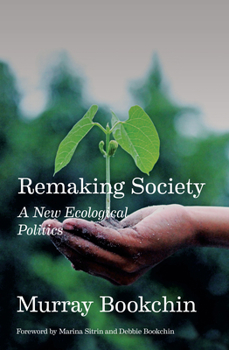Remaking Society: A New Ecological Politics
Select Format
Select Condition 
Book Overview
Breathing new life into revolutionary ideas.According to Murray Bookchin, a humane solution to the climate crisis will require replacing industrial capitalism with an egalitarian, ecological society; decentralized democratic communities; and sustainable technologies. Drawing on rich traditions of ecological science, anthropology, history, utopian philosophy, and ethics, Remaking Society offers a coherent framework for social and ecological...
Format:Paperback
Language:English
ISBN:1849354421
ISBN13:9781849354424
Release Date:February 2023
Publisher:AK Press
Length:224 Pages
Weight:0.66 lbs.
Dimensions:0.7" x 5.2" x 7.9"
Customer Reviews
4 ratings
Social ecology in a nutshell
Published by Thriftbooks.com User , 17 years ago
This book summarizes the eco-anarchist "Social Ecology" that Bookchin developed towards the end of his life. Bookchin argues against the anti-humanist and mystical tendencies in the modern environmental movemnent, making the claim that "nearly all ecological problems are social problems" that have arisen out of the hierarchy and domination that humans engage in over each other. He traces the emergence of hierarchy out of primitive tribal society-- through domination of tribes by elders, through the rise of warrior castes, cities, and finally the modern nation state and capitalism. He traces the parallel development of social structures of freedom that constantly emerged and were submerged as hierarchy took over-- from the Athenian polis to the city-state of the middle ages, millenarian Christian movements, and modern worker's movements up through the New Left of the 1960s. He makes a powerful case for the possibility of a decentralized, directly democratic, and ecologically sustainable social order organized in a federated system of local "libertarian municipalities". Unfortunately, his vision of how to get "From Here to There" is fairly thin gruel-- a vague picture of the grassroots takeover of local governments through electoral organizing. For a more robust vision of social change, I highly recommend Bookchin's earlier collection "Post-Scarcity Anarchism", a nuanced and searching look at modern possibilities for anarchist revolution.
Outstanding...
Published by Thriftbooks.com User , 18 years ago
I learned so much from this book, having a copy is an absolute necessity if you want to learn the history of society and social thought. Mr. Bookchin offers very different perspectives on some things that we take for granted in the history of humanity. Anyone interested in humanities or social theory or the environment would do well to read this book. Indispensible!
Very good treatise of anarchist thought
Published by Thriftbooks.com User , 21 years ago
The author looks back first to ancient tribal structures and finds a very egalitarian ethos in all aspects of life. The growth of hierarchies related to age, gender, wealth, etc, to a large extent eliminated that egalitarianism. These hierarchies seem to have began with age: old people could claim special powers for their accumulated wisdom and knowledge of tribal customs. Then war was made necessary to defend the attacks of aggressive neighboring communities: hence men with their specialties in military affairs gained dominance over women and their sphere. This need justified the centralization of power. Male chiefs who had functioned as generous community leaders and in whom any concentration of wealth or arrogance was an ultimate taboo, became despots. But many communities retained an egalitarian ethos and some communities even reverted to non-hierarchal forms of society after undergoing a despotic phase, such as the American Mound Builders and the Mayans. He notes that a good example of egalitarian indigenous values was on display when Hopi Indian children were attempted to be instructed in competitive sports by the whites sent to "civilize" them but they couldn't understand the concept of keeping score. The bourgeoisie was significantly thought of as a marginal and anti-social element in every area of the world before capitalism emerged in Europe In the middle ages, markets were largely local, carefully regulated by guilds of craftsman. The nobles mainly sat on their on butts and took huge rents from their miserable serfs. It never occurred to them to horde poor people in factories and not uncommonly drive them to death to make goods and then make sick money from those goods whose wealth was created by their slaves. The marginal bourgeoisie class seems to have aspired to accumulate enough wealth to buy estates so they could live like the nobles.The bourgeoisie became most powerful in England in the early Renaissance years. The nobility had largely destroyed itself trying to loot and ravage France during the War of the Roses. The new nobles were appointed from a lower class, the bourgeoisie and other middling sorts who had the instinct to relentlessly accumulate wealth and find new ways to exploit the inferior classes. With the growth of the bourgeoisie, the power of the state grew. There was serious resistance to the growth of state power by the nobles and rural communities, the latter who might have initially seen state power as buffer against abuses by the nobles but quickly discovered the bourgeois state was in many ways worse. He points to the interesting obviously flawed but still relatively egalitarian utopian visions of people like Thomas More.The author has some interesting things to say about Marxism. That history goes through automatic stages is bunk. Marxism denies any root of spontaneity for organizing in communal egalitarian fashion. It can lead to the acceptance of plundering the earth's resources and exploitation of labor on t
"Remaking Society:" a map of Bookchin's complex thinking
Published by Thriftbooks.com User , 27 years ago
Murray Bookchin wrote "Remaking Society" as a synopsis of his life of radical thought. Bookchin details his theories of history, ecology, and political organization, with other subjects along the way, within his "Remaking Society." The language and the point are quite straightforward and the book serves as a handy reference to his prolific writing career.






